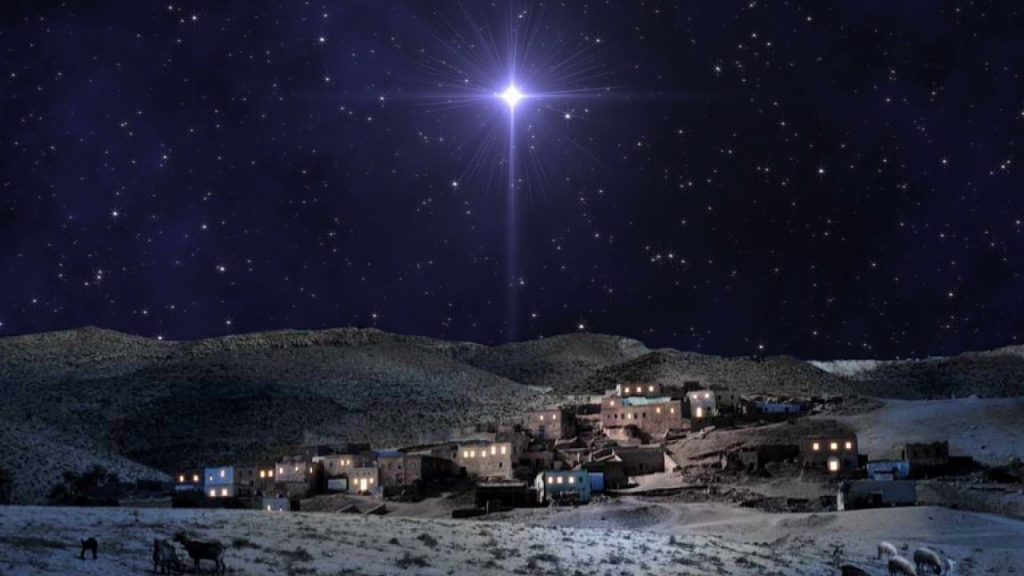
Throughout this season of Advent our focus is “The Story of Christmas in 20 Words.” On each of the 20 weekday mornings ending on Christmas Eve, we’ll spotlight a single word from the Gospel accounts that helps us ponder more deeply the birth of Jesus.
16. Bethlehem
Big things happen in small towns.
There are more than 19,500 American communities with fewer than 1,000 residents – and that number doesn’t include myriad unincorporated villages, hamlets, and wide places in the road.
Many of these small communities have distinctive names. And behind every name there’s a story.
In 1950, Ralph Edwards hosted a popular TV game show. He announced that the 10th anniversary program would be broadcast from the first town willing to rename itself after the show. That’s how Hot Springs, New Mexico, became Truth or Consequences.
Scratch Ankle, Alabama, is infamous as a haven for mosquitoes. When a local reporter asked one of its residents why the town chose such a strange name, she replied, “If you roll up your pants and sit out in the afternoon, you’d call it Scratch Ankle, too.”
A small Arizona community near a fork in the road decided to call itself Y. State law, however, required that all place names have a minimum of three letters. That’s why Y, Arizona, became Why.
An enterprising physician named Dr. Springer – later branded “the king of quacks” by the American Medical Association – founded a small community in California where he hoped to create a medical mecca. Because his marketing campaign described his efforts as “the last word in health,” he named the town Zzyzx (pronounced “Zye-Zex”), thus ensuring it would appear last in any directory or Yellow Pages listing.
Greasy Corner, Arkansas, got its name because a restaurant opened inside the same building as an auto shop – and one customer memorably received a plate of food accompanied by a smudge of axle grease.
The residents of No Name, Colorado and Uncertain, Texas both filled out applications for incorporation in their respective states. When asked what names they preferred, they wrote “No Name” and “Uncertain” as placeholders until they came up with better options – apparently never dreaming those placeholders would become final designations.
Then there’s Hell, Michigan, so named by 19th century farm wives who were angry with their husbands for regularly transforming their grain into whiskey at a local still. Yes, Hell does freeze over, especially at this time of year. Visitors can get married in Hell and even serve as mayor of Hell for a whole day.
You have to have a sense of humor to live in Good Grief, Idaho; Bitter End, Tennessee; Bugtussle, Kentucky; Ding Dong, Texas; Toad Hop, Indiana; Booger Hole, West Virginia; Accident, Maryland; and Boring, Oregon (which advertises itself as “an exciting place to live”).
Which brings us to the small towns where the Son of God is said to have entered the world and spent his childhood.
Bethlehem means “house of bread.” Historians don’t know precisely why. It’s possible that a bakery was there, or that the town’s proximity to fertile grain fields enhanced its reputation. But its significance was changed forever when Jesus said, during the course of his ministry, “I am the Bread of Life” (John 6:35).
The Bread of Life – the one thing that the whole world needs to be spiritually healthy – was born in Bethlehem, the House of Bread.
After Joseph and Mary fled to Egypt for two years, ensuring that Jesus would be safe from the clutches of the murderous King Herod, they returned to Mary’s hometown of Nazareth. Archeologists guess that around 30 families lived there. A first century survey listed 200 villages in Galilee. Nazareth didn’t even make the cut.
It’s possible that when Matthew tells us that Jesus “went and lived in a town called Nazareth” (2:23), he’s letting us know that Jesus was perceived as a Nobody from Nowheresville.
We may be tempted to think that we ourselves are people of little consequence, living unnoticed lives in unimpressive places.
But when it comes to God, as the theologian Francis Schaeffer wrote, there are no little people and there are no little places.
Big things happen in small towns.
It was in a small town, after all, that the most important thing that ever happened – happened.
In Bethlehem, God entered the world as a human being.
